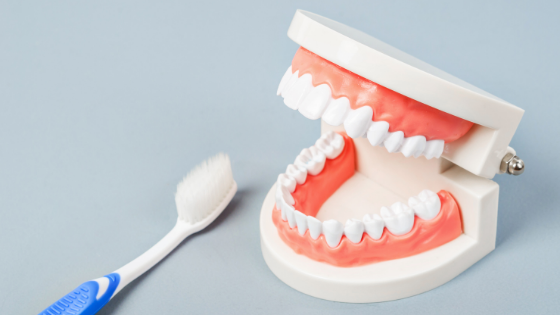All About Gum Disease

New Year, New Smile with Cosmetic Dentistry Treatments
December 14, 2020
10 Facts for Children’s Dental Health Month
February 15, 2021All About Gum Disease
 Dr. Prashant Rao, DDS, a Charlotte native and NYU-trained dentist, specializes in esthetics, dental implants, and preventative dentistry.
Dr. Prashant Rao, DDS, a Charlotte native and NYU-trained dentist, specializes in esthetics, dental implants, and preventative dentistry.
Do you see a bit of pink in the sink when you brush your teeth or feel tenderness at the gumline? If so, you may have a condition called gum disease, or periodontitis. It’s an infection of the gums that damages the soft tissues in the mouth. As a progressive condition, it will worsen over time, leading to periodontal disease, a more advanced and dangerous form. Without treatment, gum disease can lead to tooth loss and bone infection.

Why Does Gum Disease Happen?
Gum disease develops because of a buildup of bacteria in the mouth. There’s always some level of bacteria present. However, with good oral hygiene, the amount of bacteria present is controlled and overall safe. When a person does not brush and floss properly, or doesn’t come in for teeth cleanings, this can allow that bacteria to flourish. As it does, it invades the soft tissues of the mouth, into the roots of the teeth, and beyond.
It can even travel through your body once it gains access to the bloodstream. If that occurs, it can attack the muscles of the heart as well as lead to damage in the brain.
Periodontitis is mostly preventable. Yet, once it occurs, it can be hard to treat. Professional care is the best way to bring it back under control to minimize the advancement of this condition.
Signs of Gum Disease
Symptoms of gum disease worsen over time. Your gums are healthy if they are pink and are snug against the tooth. If there is any room between the gum and the tooth, that’s an indication of injury or gum disease. Other signs include:
- Puffy, swollen gums
- Tender gums
- Red- or purple-colored gums
- Bleeding gums
- Gums that pull away from the teeth or are no longer attached
- Loose teeth
- Bad breath that’s hard to get rid of (that’s the gas produced by the bacteria)
- Spaces developing between the teeth
As gum disease worsens into periodontal disease, you may also notice more pain, significant bleeding, and teeth that seem very loose. You may also see gaps forming between the teeth. Your teeth may look longer than normal. Sometimes, there are also alignment changes.
What Causes Gum Disease and Periodontal Disease?
The most common cause of gum disease is the buildup of plaque from bacteria. The plaque causes gingivitis, the mildest form of gum disease. Over time, this leads to painfully red gums as the pockets caused by bacteria form. These pockets are located along the edges of the tooth, near the gums. The pockets are what create the gaps you have. Soon, the gums cannot hold the teeth in place any longer.
Preventing Gum Disease is Possible
It’s always important to protect your oral health. Gum disease can be aggressive and leads to a wide range of complications. It has been linked to respiratory disease development, coronary artery disease, rheumatoid arthritis, autoimmune disorders, and diabetes. Prevention includes:
- Good oral hygiene at home including brushing at least twice a day and flossing at least once (though more is beneficial)
- Scheduling routine dental examinations with teeth cleaning at least one time every six months
What Can Be Done to Treat Gum Disease?
Treatment is highly effective if caught early in the gingivitis phase. This may involve teeth cleaning and, in some cases, medications to manage the infections.
When periodontal disease occurs, there is a need for specialized treatment. Periodontal therapy often involves deep cleaning of the teeth to remove all of those pockets of bacteria and plaque. This is done by pulling away the gums, cleaning the surface of the tooth and root, and then placing the gums back in place. This can also be very effective.
Bacteria like this can also damage teeth. If that occurs, it may be necessary to have the teeth extracted that are beyond repair. Other teeth may need other types of restorative dentistry services to bring back the strong, healthy smile you had.
How to Get Help for Gum Disease Today
If you have painful gums or bad breath that doesn’t go away, reach out to Cedar Walk for an appointment. Our team will provide comprehensive exams, x-rays, and proper cleanings to help control the bacteria buildup. We can also provide periodontal disease treatment if your condition has worsened. Expect outstanding help and support from us every step of the way.
Get started by calling for an appointment with your dentist today. Then, start working on improving oral hygiene habits that can influence overall health.
Practice Recognitions
Recent Posts
- How Long Do Same-Day Crowns Last?
- Top Cosmetic Dental Procedures: Start 2025 With a New Smile
- What is a Zirconia Crown
- How To Know If You Need a Root Canal
- Invisalign FAQ: Your Top Questions Answered!
- Invisalign vs. Smile Direct: What Is The Difference?
- Itchy Gums: Causes, Relief, and Prevention
- The Benefits of Dental Implant Surgical Guides
- Wisdom Teeth Removed: 5 Signs You May Need to Remove Yours
- Tips For Wisdom Teeth Pain Relief: All You Need To Know




